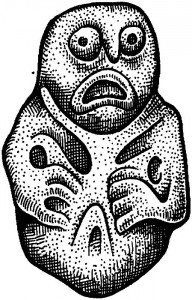Adapted from an article that appeared in B.C.FOLKLORE
Issue No.1, pp.4-5
 Cultus Lake, in the Fraser valley, is a well-known summer recreation spot for Vancouverites. The Chilliwack First Nation call the lake Swehl-tcha, which refers to a time when it was an empty basin that later filled with water.
Cultus Lake, in the Fraser valley, is a well-known summer recreation spot for Vancouverites. The Chilliwack First Nation call the lake Swehl-tcha, which refers to a time when it was an empty basin that later filled with water.
The word cultus is well-established in B.C. vocabulary and is still occasionally used although it is not now as common as it was. The word comes from Chinook Jargon, the early trade language of the Northwest, and has a number of meanings, generally some form of worthless or bad, especially cultus man. Cultus potlatch, for example, derives from cultus together with the West Coast word potlatch, a ceremony where gifts of some value were given. Although not stated, a return gift is nevertheless expected at some future date. When potlatch and cultus are put together the meaning is a gift of little or no value.
Regarding Cultus Lake and the reason for its naming, it was not until reading the notes compiled by Betty Keller, for the late Norman Lerman’s Legends of the River People, that an explanation was forthcoming. Ms. Keller writes…
This lake is reputed to be “bottomless.” Before the events described in this story the Indians say that there existed here several small creeks which disappeared into an underground passage on the site of the present lake. Koothlak’s dike partially blocked this passage. Another story tells of a young man who went swimming there and was swept from the sight of his friends by an underground current. “Sometime after, down there at Mud Bay between White Rock and Point Roberts, some young men were out spearing seals and they found this body drifting.” (The body was identified by its decorations.) “They didn’t know where this underground river was until this young man drowned and came out at Mud Bay.” There are also reports of a three foot long devilfish and a fourteen inch blackfish (both saltwater fish) found on the Cultus Beach by Chilliwack Indians.
Both the belief that it is bottomless and the strange, unexplained occurrences at the lake have led to its present name. This is further supported by the Chilliwacks’ tradition of supernatural monsters, or shla-lah-kum, living in the lake.
